Photo

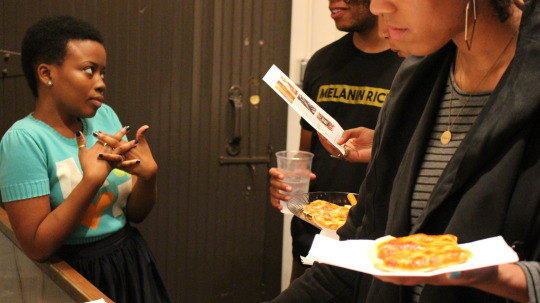

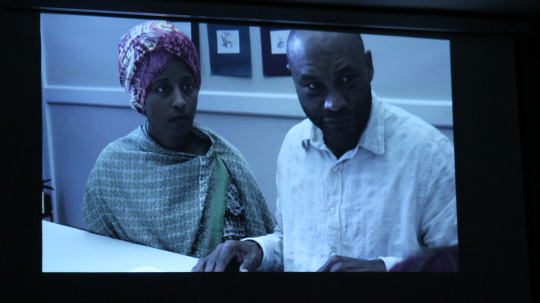

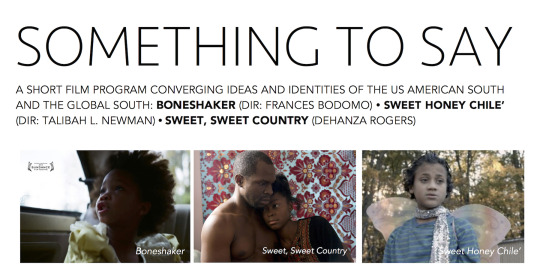

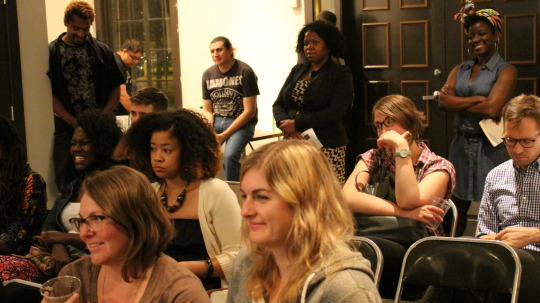
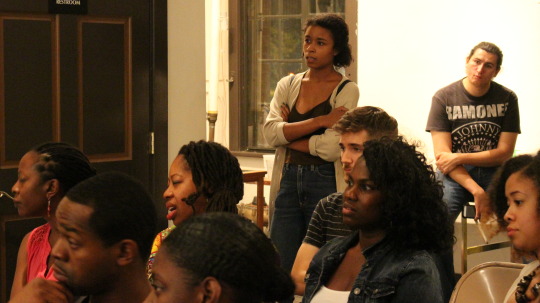
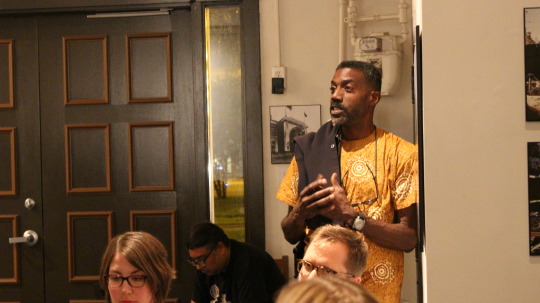
A few photos from our ‘Something to Say’ film program last week at Comfort Station. Photos courtesy of Ka’Sella M.
6 notes
·
View notes
Photo

Click here to reserve your ticket.
#Chicago#chicago events#chicago reading africa#cranews#black film#african film#frances bodomo#talibah l. newman#dehanza rogers#directedbywomen
3 notes
·
View notes
Text
July 18 | Everything Must Come to Light: The Films of Mpumi Njinge
Saturday, July 18th @ 7pm
Hyde Park Free Theater, 1448 E. 57th St.
About Njinge via Southside Projections:
South African clothing designer, actor, and filmmaker Mpumi Njinge completed just two films before his death of AIDS-related illness in 2002. Both films are informal documentaries exploring the lives of queer folk in the townships of South Africa. My Son the Bride (2002, 24 min.) documents what is thought to be the first same-sex marriage between black men in South Africa, exploring a young man’s struggle with his family and his community to accept his sexual preference and bless his union. Everything Must Come to Light (co-directed by Paolo Alberton, 2002, 25 min.) tells the stories of three lesbian sangomas (traditional healers) in Soweto, delving into their relationship with their ancestors, and the role their ancestors play in their healing powers and sexuality.
A post-screening conversation will follow. Click here for full details.
4 notes
·
View notes
Video
youtube
Polyglot, a new web series from Amelia Umuhire is a must-watch. View episode 1 above, and episode 2 here.
h/t: DynamicAfrica
2 notes
·
View notes
Link
Next Thursday, July 9th at the Poetry Foundation in Chicago:
The Poetry Society of America continues its 2015 national series, A Celebration of International Poetry, at the Poetry Foundation in Chicago. The series will travel to six cities and focus on major international poets from any era.
In this third installment, we celebrate five emerging poets from Africa, Amy Lukau, Tsitsi Jaji, Ladan Osman, Viola Allo, and Warsan Shire, whose work has been recently published in the New Generation African Poets chapbook series, a publishing initiative of the African Poetry Book Fund (APBF). Co-editors Chris Abani and Kwame Dawes, along with APBF Editorial Board Member Matthew Shenoda, will discuss the project and introduce the emerging poets, who will then read from their work.
#cranews#Chicago#chicago events#Ladan Osman#Warsan Shire#Viola Allo#poetry#Amy Lukau#Tsitsi Jaji#African poets
0 notes
Photo

some of my grandfather’s books
239 notes
·
View notes
Quote
It seemed to be a makeshift replacement for love, absenting oneself from stifling atmospheres, because love basically was a torrential storm of feeling; it thrived only in partnership with laughing generosity and truthfulness.
Bessie Head, A Question of Power
0 notes
Link
Sara Bivigou on worship spaces in London:
Places I’ve gone in search of God: The function suite of a North London bowling alley, a Grade II-listed rock venue way past its prime, a pub basement, two mouldy rooms in a dilapidated hotel on Seven Sisters Road, the rough as fuck Temple club in Tottenham (knocked down in 2004, now a set of luxury flats), and more than a dozen industrial estates. Spaces that were once reserved for heavy industry—storing, building, fixing, whatever, where old metals were scraped and clanged to work and then put to rest—are now, in London, overwhelming sites of African Christian worship.
You can spot these places by the wonky and wonkily optimistic PVC banners hanging on their outsides:
“Faith Miracle Centre”
“Jesus Is Risen Temple”
“Mountain of Fire Ministries”
Scriptures, affirmations, and contact details are also printed on these glossy signs. Their words so idiosyncratically coloured, capitalised, and italicised that you can’t help but read them in the booming salesman-like voice of an evangelical pastor.
I affectionately call these places “trash spaces” because they look as though they’ve been thrown away. Even after a congregation of Africans has come along, dusted them off and put them to use, they feel reluctant.
Continue reading here.
0 notes
Link
A quick history lesson courtesy of africasacountry:
A commonplace explanation why the likes of Dylann Roof shouldn’t be termed “terrorists” is that their violence isn’t political since it isn’t tied to a broader ideological agenda. This is wrong. In Roof’s case, the photograph of him sporting a jacket embroidered with the flags of Apartheid South Africa and Rhodesia shows this is especially implausible. Like the Norwegian mass-murderer Anders Breivik, Roof clearly understood himself to be fighting for a political cause — white supremacism.
But Roof is by no means the first white American to find common cause with racist colonial regimes in Africa. That connection goes back a long way, and runs right from the top of the federal government to key figures in South Carolina politics.
Keep reading.
#crablog#Rhodesia#Zimbabwe#South Africa#Settler Colonialism#White supremacy#united states#south carolina#charleston shooting
2 notes
·
View notes
Video
youtube
Insurrection | Music break courtesy of Linton Kwesi Johnson x DJ Hiatus
1 note
·
View note
Link
It’s the famine of 1983. A father and his sons have been doing the best to manage. When the First Shampoo Hair Show arrives, they are presented with an opportunity for indulgence. Read this new short fiction from Nii Ayikwei Parkes here.
2 notes
·
View notes
Link
The latest English-translated release from Kamel Daoud, The Meursault Investigation, takes us back to a classic Albert Camus’ The Stranger. A synopsis, via Africa Bookclub:
This response to Camus's The Stranger is at once a love story and a political manifesto about post-colonial Algeria, Islam, and the irrelevance of Arab lives. He was the brother of "the Arab" killed by the infamous Meursault, the antihero of Camus's classic novel. Seventy years after that event, Harun, who has lived since childhood in the shadow of his sibling's memory, refuses to let him remain anonymous: he gives his brother a story and a name--Musa--and describes the events that led to Musa's casual murder on a dazzlingly sunny beach. Harun is an old man tormented by frustration. In a bar in Oran, night after night, he ruminates on his solitude, on his anger with men desperate for a god, and on his disarray when faced with a country that has so disappointed him. A stranger among his own people, he wants to be granted, finally, the right to die.
Over on the New Yorker, you can read an excerpt of the book, “Musa.” For more on Daoud, read Adam Shatz’s profile of him in the New York Times Magazine.
2 notes
·
View notes
Audio
In the April 5th edition of the Writers Project of Ghana radio show, Martin Egblewogbe talks with a few of this year’s Caine Prize Workshop participants.
For live episodes, tune in to Citi FM (online) every Sunday at 830PM GMT/330PM CDT
0 notes
Audio
Check out this panel discussion with three writers featured in the recent Africa39 collection of short stories. Interviewees include Chibundu Onuzo (Nigeria), Tope Folarin (Nigeria/USA), and Nadifa Mohamed (Somalia). The panel was conducted on December 1st, 2014, by English PEN and Hay Festival.
#crablog#Nadifa Mohamed#Chibundu Onuzo#Tope Folarin#African Writers#Somali Writers#Nigerian Writers#African Diaspora#Africa39
2 notes
·
View notes
Video
youtube
Watch + Listen as Kévi discusses the police in France, the Negritude movement and more in the latest episode of Cecile Emeke's flâner.
0 notes
Photo

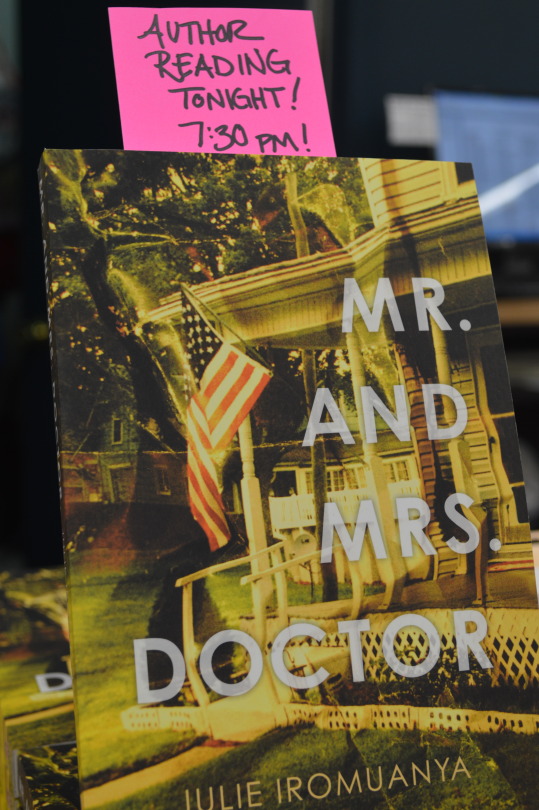

8 May 2015. The launch of Julie Iromuanya’s Mr. and Mrs. Doctor at Women and Children’s First Bookstore.
1 note
·
View note
Quote
Wasn't it an excellent thing to be black, with a fine, shining skin fitting neatly over the joints and well oiled with shea butter?
Maryse Condé, Segu
#Crablog#Maryse Condé#fiction#guadeloupe#historical fiction#african fiction#blackness#blackisbeautiful#Segu
2 notes
·
View notes